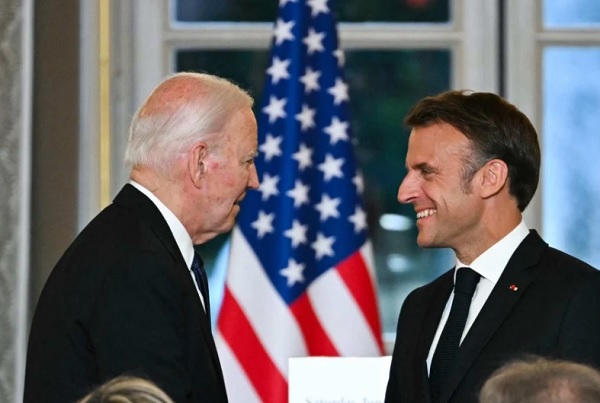Washington, D.C., June 10, 2024 — In a bold and unprecedented move, U.S. President Joe Biden and French President Emmanuel Macron have jointly announced a decision to utilize frozen Russian assets to provide significant financial aid to Ukraine. This decision, aimed at supporting Ukraine in its ongoing conflict with Russia, has sparked a global debate, with potential far-reaching implications for international law, diplomacy, and the geopolitical landscape.
The Decision
The announcement came after a series of high-level meetings between the United States and France, culminating in a bilateral agreement to channel billions of dollars from seized Russian assets into Ukraine’s reconstruction and defense efforts. These assets, which have been frozen under international sanctions imposed on Russia following its invasion of Ukraine, represent a substantial financial resource that the Western allies have decided to repurpose.
In a joint statement, Biden and Macron emphasized the moral and strategic imperative behind their decision. “The use of these assets will help Ukraine rebuild and defend itself against aggression. It sends a clear message that acts of unprovoked aggression will not go unpunished, and the international community stands with Ukraine,” they declared.
Impacts on Ukraine
For Ukraine, this financial infusion could be a game-changer. The funds are expected to be allocated towards rebuilding critical infrastructure, bolstering military capabilities, and providing humanitarian aid to millions of displaced and affected civilians. Ukrainian President Volodymyr Zelensky expressed profound gratitude for the support, stating, “This aid is a lifeline for Ukraine. It will strengthen our resilience and help us stand firm in the face of Russian aggression.”
Legal and Ethical Debates
The decision has ignited a complex legal and ethical debate. Critics argue that repurposing state assets, even those frozen under sanctions, sets a dangerous precedent in international law. Some legal experts caution that such actions could undermine the sanctity of sovereign assets and lead to retaliatory measures by other states.
International law specialist, Professor Elena Kostyuchenko, noted, “While the intention behind the move is understandable, it raises significant questions about property rights and the rule of law. There needs to be a careful consideration of the long-term implications of such actions.”
Geopolitical Reactions
The global reaction has been mixed. Western allies, including the United Kingdom, Canada, and Germany, have expressed support for the initiative, viewing it as a necessary step to counter Russian aggression and support Ukraine. NATO Secretary-General Jens Stoltenberg endorsed the decision, stating, “This is a strong message of solidarity with Ukraine and a clear demonstration that aggression will not go unanswered.”
Conversely, Russia has vehemently condemned the decision, with President Vladimir Putin accusing the West of “economic banditry” and threatening retaliatory measures. The Russian Foreign Ministry warned of severe consequences for what it described as “theft of Russian property.”
China, a key global player with close ties to Russia, also expressed concern. The Chinese Foreign Ministry called for restraint and urged for solutions within the framework of international law and diplomacy.
Economic Implications
The move could also have broader economic implications. Financial markets are likely to react to the potential risks associated with asset seizures and the precedent it sets. Analysts suggest that this decision might lead to increased caution among global investors regarding the security of their assets in foreign jurisdictions, potentially impacting international investment flows.
Looking Forward
As the world watches this unfolding situation, the decision by Biden and Macron marks a significant moment in the ongoing conflict between Ukraine and Russia. It underscores the West’s commitment to supporting Ukraine but also highlights the complexities and risks involved in such unprecedented measures. The international community will be closely monitoring the outcomes of this decision, both for Ukraine’s immediate benefit and for its broader implications on international law, diplomacy, and global economic stability.


